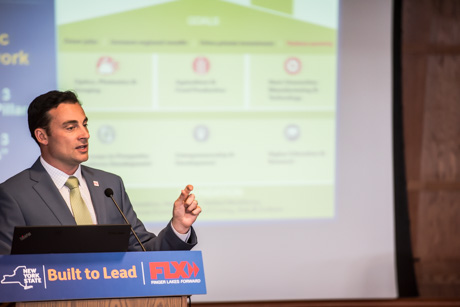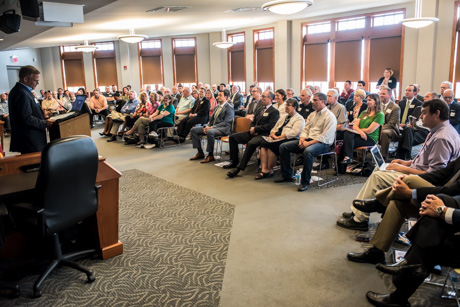Stephen Quider, left, is the newest officer on the Batavia City police force. He was introduced to City Council tonight by Chief Shawn Heubusch, who said Quider has completed his 16 weeks of field training. The West Henrietta resident is in the process of relocating to the City.
---------------
Now that the rezoning of several parcels owned by City Church’s St. Anthony’s campus on Liberty Street is finally official, leaders of the Teen City project are rolling up their sleeves to expedite the transition of the Batavia Youth Bureau from its current MacArthur Drive location.
“We’re looking at the first quarter of the year (2019) to open Teen City, collaborating with the YMCA,” said Jocelyn Sikorski, Batavia Youth Bureau executive director, at tonight’s City Council meeting at City Hall. “We have put together an aggressive timeline.”
After a few months of discussion and planning board meetings, Council voted unanimously to change the zoning of five tracts on Liberty Street and one on Central Avenue from R-3 Residential to C-3 Central Commercial in order for City Church to offer business activities to the public and, as a result, pave the way for the youth bureau’s relocation.
Teen City is the name for the after-school program that will be operated by the Batavia Youth Bureau and YMCA, with assistance from City Church.
Sikorski, in a memo to City Council dated Dec. 5, wrote that a lease/operating agreement with City Church has been drafted and reviewed by City Attorney George Van Nest.
“This (anticipated approval of the lease by City Council) will enable us to move into the next steps regarding modifications to the facility, including renovations to the cafeteria as well as IT and security needs,” Sikorski wrote.
She added that bids for the work will go out over the next few weeks, and that a memorandum of understanding between the Batavia Youth Bureau and YMCA for shared staffing and oversight of the after-school program is being developed.
Sikorski’s committee has prioritized the necessary documents along with an intermunicipal agreement with the Batavia City School District for the current youth center site and transportation, along with a Teen City logo design contest. If all goes according to plan, a “kickoff event” will take place on Feb. 22.
Responding to a query from Council Member John Canale, Sikorski said the school district intends to take over the existing youth bureau building – occupying it and paying all expenses.
“This would not be a lease,” Sikorski said, adding that the Community Garden there would not be affected.
In a related move, Council voted to accept a $10,000 grant from the New York State Education Department to help fund the after-school program and another $1,000 from the County Youth Bureau for equipment, supplies and materials.
In other action, Council:
-- Passed a local law making Thorpe Street a one-way street for southbound traffic between Watson and Maple streets.
Thorpe becomes the seventh street in the City designated as one-way, joining Hewitt Place, Lewis Place, McKinley Avenue, North Spruce Street, School Street and Wiard Street.
-- Extended for a year -- three pacts with Genesee County relating to water supply, operation and maintenance of the water treatment plant and lease of the water treatment facility. This was done to allow the City and County to forge a long-term contract in tandem with a sales tax agreement.
In a memo dated Dec. 4, DPW Director Matt Worth noted two new changes to the water supply agreement:
- Leaving the index allowing for a maximum change in the cost of wholesale water purchased by the City to remain as the Consumer Price Index, which is consistent with the existing contract, and
- Making Genesee County a co-applicant or endorsing entity of any funding applications prepared by the City for services related to the removal of lead within the system.
Worth stressed that the City has no issues with lead, but included that provision to deal with any necessary improvements down the road.
-- Voted in a favor of a new three-year lease and sublease (through April 1, 2022) with the New York-Penn League for use of Dwyer Stadium for the league-owned Batavia Muckdogs.
The proposed lease is consistent with the most recent lease – “it has the same language as the current lease and sublease except for the term,” Van Nest said -- and calls for a $25,000 capital investment by the City into the facility annually.
-- Heard a brief report from City Manager Martin Moore regarding a pair of Downtown Revitalization Projects that are “moving along.”
Moore said he met with representatives of Empire State Development Corporation last week and was informed that funding for the Ellicott Place project is “on its way” and for the Healthy Living Campus project is due by the end of the week.
He also said that the Batavia Development Corporation’s “kickoff meeting” for mini-grants is set for next week.
Council then authorized Moore and Council President Eugene Jankowski to sign paperwork to receive an ESDC reimbursement grant in the amount of $25,000 to assist the Genesee Area YMCA in preparing a feasibility study for the Healthy Living Campus.
-- Appointed Bob Gray and Leslie Moma to the Community Garden Committee through Dec. 31, 2022, and Sharon Burkel to the Historic Preservation Commission through Dec. 31, 2021.
During a Conference Meeting following the Business Meeting, Council agreed to take up at its next meeting (Jan. 14) two resolutions dealing with a Community Development Block Grant for 900 linear feet of water main on Brooklyn Avenue in the amount of $333,000.
Worth said the project, along with drainage work at Williams Park and along the Tonawanda Creek bank, calls for an environmental impact review and a resolution stating who the certifying officer would be (in this case, Jankowski).
The project is slated to go to bid in March, Worth said.



